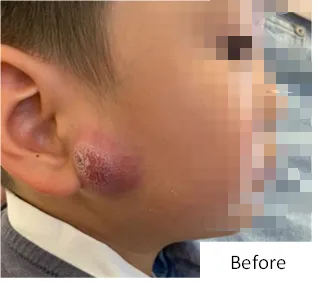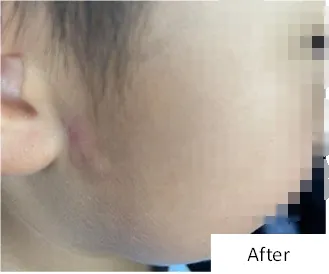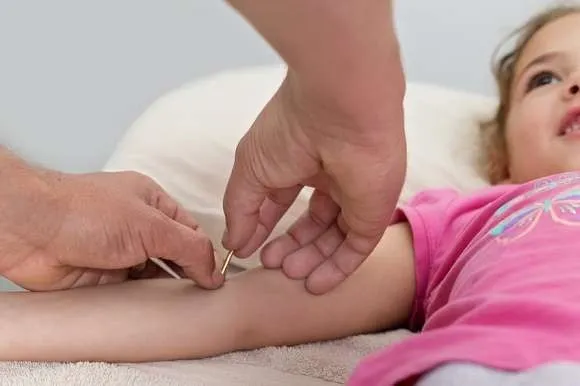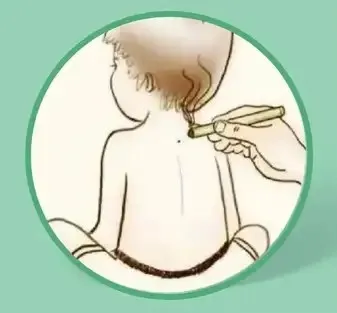Before delving into the main subject, let us allow Dr Zhu to review some cases of his work.
Case One:
A three-year-old child suffered from acute parotitis. The application of antibiotics in Western medicine proved to be less effective, prompting the child to seek Dr Zhu's help.
Through the administration of an antiviral herbal decoction and massage techniques, the swelling subsided. Throughout the treatment, there were no instances of high fever, and surgery was deemed unnecessary.
Of particular concern is that the parotitis virus can potentially impact the gonads, leading in some cases to testicular atrophy and infertility due to compromised sperm production. Under Traditional Chinese Medicine (TCM), this child experienced no discomfort in the “eggs”, and TCM not only addressed the condition but also safeguarded the child's reproductive health, offering the greatest reassurance for both the child and the parents.


The second case:
Should you or your children are experiencing sleeplessness prior to an examination, feel anxious, and notice a loss of focus on questions you are well-versed in during the test-taking period, consider scheduling an appointment at Dr Zhu's clinic for a soothing acupuncture session. It could markedly enhance your academic performance.
Returning to our subject, this question may seem boring, yet for individuals of shorter stature—men measuring less than 1.7 meters and women under 1.6 meters—many opt for a 20-centimeter increase.
As living standards have risen and taking into account that we are in Australia, where average height is among the highest in the developed world, the growth prospects of the next generation are a significant concern for many parents. It's even become a factor in the criteria some consider when selecting a partner for marriage.
So, what is the process through which a child grows in height? What elements affect this growth? Dr Zhu will address these concerns and provide enlightening insights into this matter for parents.
Firstly, a child's height is greatly influenced by genetics, with the currently accepted figure being 70%, meaning it is related to the parents' height.
Which parent has a greater impact on the child's height? Is it true, as the folk saying goes, that "if the father is short, it affects just one; if the mother is short, it affects the whole brood"?
Research data shows that the heritability of height for fathers and mothers is 89% and 87% respectively. In other words, there is no significant difference in the heritability of height between parents.
Since about 70% of a person's traits are predetermined by genetics, does this mean that the remaining 30% of environmental factors are inconsequential and beyond our control?
Parents who feel they've started at a disadvantage need not be overly pessimistic. Do not underestimate this 30%: if managed well, it can make a significant difference.
For example, a child who might naturally grow to be 160cm could potentially reach 190cm with the right environmental influences, much like how siblings with the same parents can have considerable height differences. NBA star Jeremy Lin is a case in point; his parents are only 168cm tall, but with the right environmental factors, he grew to be 191cm.
The key takeaway is that with the correct approach, every child has the potential to grow an extra 10 centimeters.
To effectively understand the 30% of postnatal factors, what are the appropriate strategies? Which methods can only be discerned upon consultation with a physician?
Dr Zhu, drawing upon extensive clinical experience, has distilled these four key principles:
1.Balanced nutrition
2. Proper exercise
3. Adequate rest
4. A positive mindset and reduced incidence of illness.
Growth hormone deficiency can lead to children having an average height that is shorter than their peers.Certain diseases, such as chronic gastroenteritis, nutritional disorders, recurrent respiratory tract infections, asthma, chronic rhinitis, and precocious puberty, can also impact a child's growth in stature.
Dr Zhu has frequently referred to growth hormones, and I presume everyone is curious about this often-misunderstood medication, so I would like to address this topic.
Firstly, it is important to clarify that all oral growth-promoting medications available on the market are essentially a form of stupid tax. Some medicine consists of nutritional supplements that include calcium, vitamin D, and amino acids. Others are harmful drugs that illegally contain sex hormones.
Since growth-promoting drugs can only be effective via subcutaneous injection, even if real growth hormone is ingested orally, it will ultimately be broken down by stomach acid and not absorbed.
Moreover, the use of growth hormone can result in femoral head dislocation, scoliosis, a risk of inducing tumors, pigment moles, and enlarged hands and feet. Therefore, growth hormone should only be used when absolutely necessary.
In light of this, some parents may become perplexed. Dr.Zhu have considered your points, but our child seems to catch colds as soon as they start school, and their height has been consistently around the 3rd percentile in their class. Our child feels self-conscious due to their stature. What can we do?
Our child has only grown 2 centimeters this year, and they are now fussy about food, reluctant to exercise, and have trouble sleeping.
Is there any other method to assist, even if it's just to gain an extra centimeter?
Here, Dr Zhu can clearly tell you that you can try the methods of Traditional Chinese Medicine (TCM) to help.
Firstly, TCM believes that increasing a child's height should be a comprehensive treatment approach, treating the symptoms specifically. Each child's situation is different, and the methods adopted are also different.
Some children who are not very tall often have recurrent colds, and their spleen and stomach functions are not good. This is because children have recurrent respiratory tract infections. Most children take medicine and get intravenous drips when they are sick, repeatedly taking medicine and getting intravenous drips, and their resistance becomes weaker.
In fact, recurrent respiratory tract infections in children are closely related to spleen and stomach functions. Stagnation can lead to spleen and stomach dysfunction, which in turn affects the lungs. However, "the lung governs the skin and hair," and when there is stagnation, the child's pores are open. Therefore, when the body surface is exposed to external pathogens, it is easy to have recurrent respiratory tract infections.
At this time, Dr Zhu uses Chinese medicine and techniques to regulate the spleen, lungs, and stomach. When the spleen and stomach functions are improved, pneumonia also gets better, and the height will increase.
Secondly, some picky eaters often have symptoms of food retention and heat, such as bloating, not wanting to eat, belching, bad breath, hot palms and soles, difficulty sleeping at night, easy to wake up, poor sleep quality, dry or constipated stools, red tongue, and thick tongue coating, etc.
At this time, Dr Zhu uses Chinese medicine (with the treatment principle of eliminating food retention and soothing the stomach, supplemented by strengthening the spleen and calming the heart), to help children regulate food retention and heat and sleep disturbances, with very good results.
Thirdly, considering the side effects and financial burden of growth hormones, some parents are unwilling to use them and the children themselves are willing to try acupuncture methods. Dr Zhu has a secret recipe for height-increasing acupuncture, once a week, each time for 40 minutes, divided into 25 minutes of acupuncture and 15 minutes of moxibustion, without the need for medication (there are no specific drugs), and the overall therapeutic effect is stable with no side effects.
Of course, for younger patients or children who are afraid of needle pricks, Dr Zhu also has a set of Tuina techniques. By stimulating specific acupoints through manual techniques, the Yin and Yang are adjusted, the meridians and blood circulation are unblocked, thereby promoting the growth and development of children.


Finally, if your children exhibit the following symptoms and their height is not ideal, you may consider bringing them to Dr Zhu for treatment and regulation. The child should be between the ages of 3 and 12 and should not have experienced epiphyseal closure.
Symptoms include:
1. A significantly poor appetite, eating very little, picky eating, or even anorexia.
2. Chronic and recurrent food stagnation with a white, yellow, or thick and greasy tongue coating and bad breath.
3 Poor sleep quality, difficulty waking up in the morning, frequent dreams, and easily waking up during the night.
4. Excessive sweating, still sweating half an hour after falling asleep, or sweating profusely from the head after slight exercise.
5.Loose or unformed stools, or constipation with dry, coarse, and pellet-like feces resembling sheep droppings.
6. A weak constitution, prone to colds, and low resistance.
7. Short stature and being thin, with little weight gain despite eating more.
8. Allergic rhinitis or chronic eczema affecting sleep.
Please note that this translation is for informational purposes only and does not constitute medical advice. Always consult with a healthcare professional for medical concerns.
Suite 5, 143-147 Somerville Boulevard, Winthrop WA 6150
Website: www.seanfamilyclinic.com
(08) 62690917 / mobile:0432917382
Hours: 9:00-18:00
Monday-Sunday
Some pictures in the article are from the Internet. If there is any infringement, please contact us to delete them.